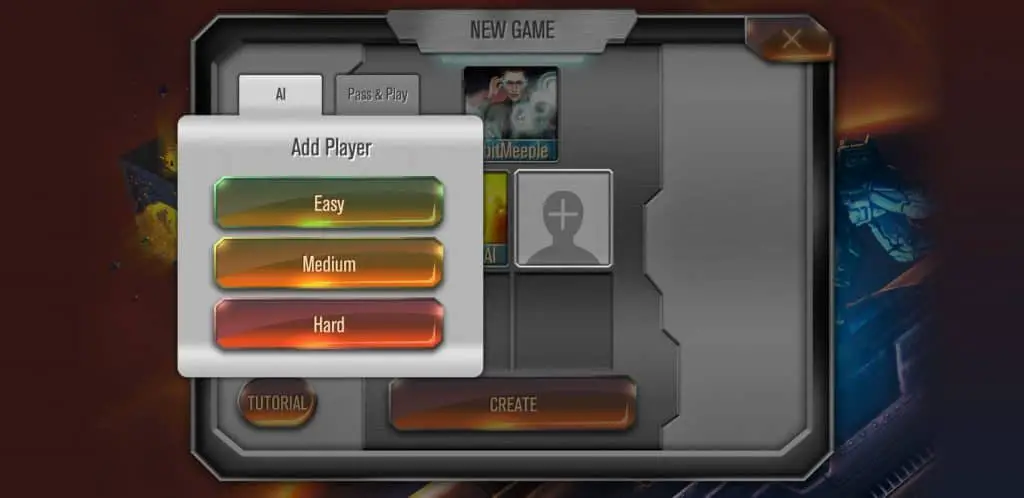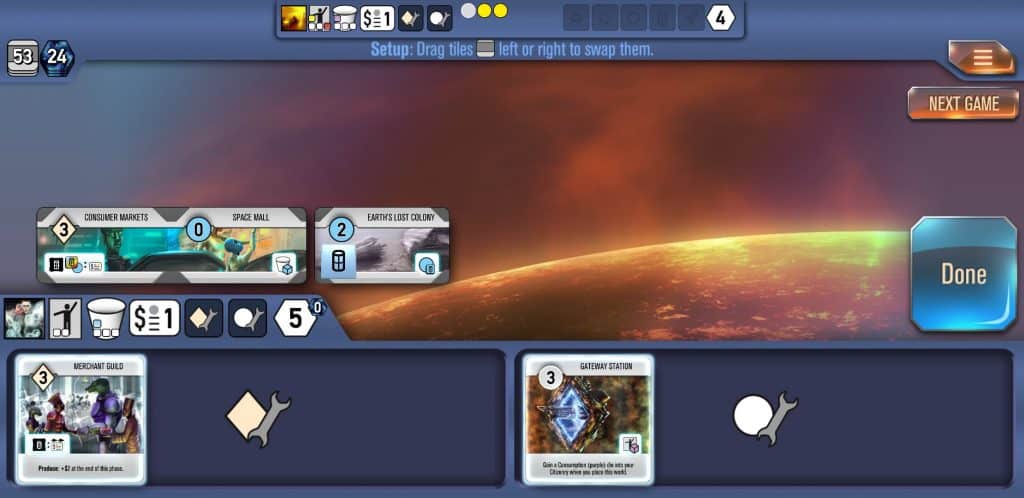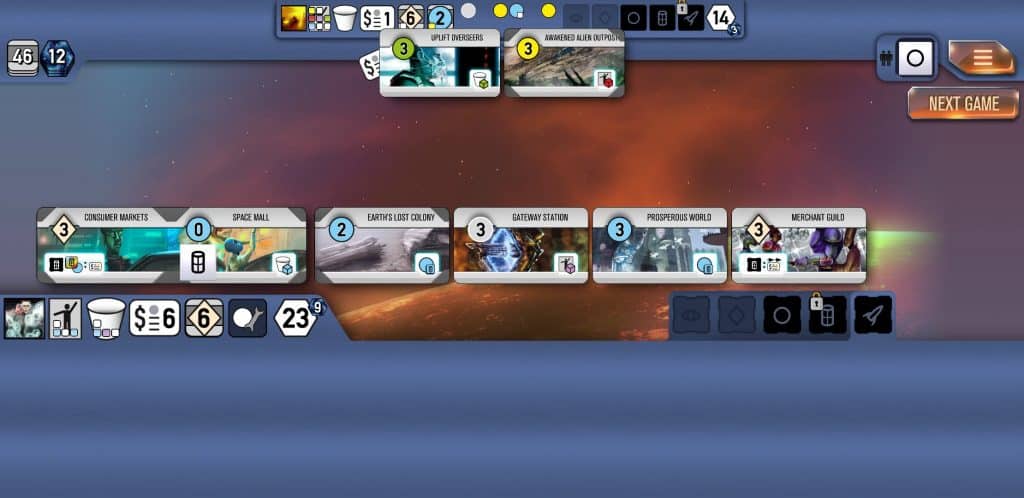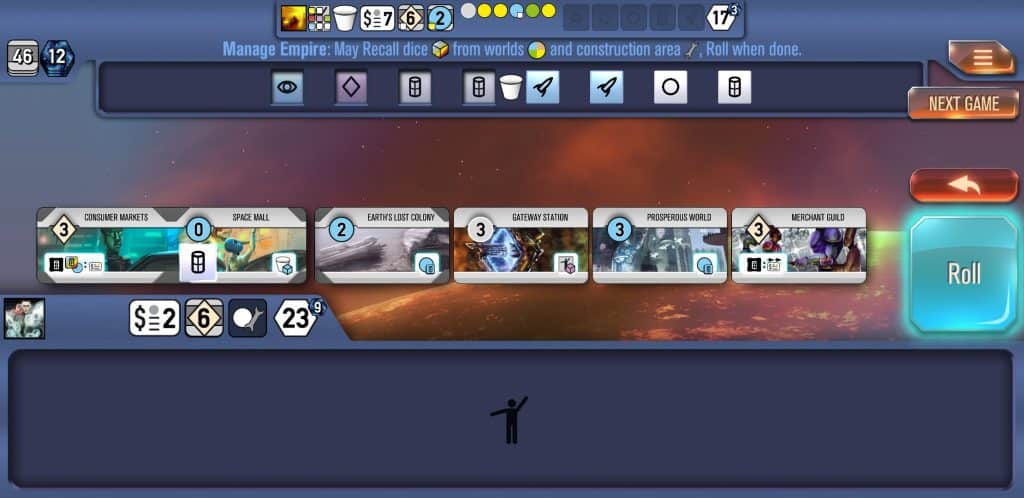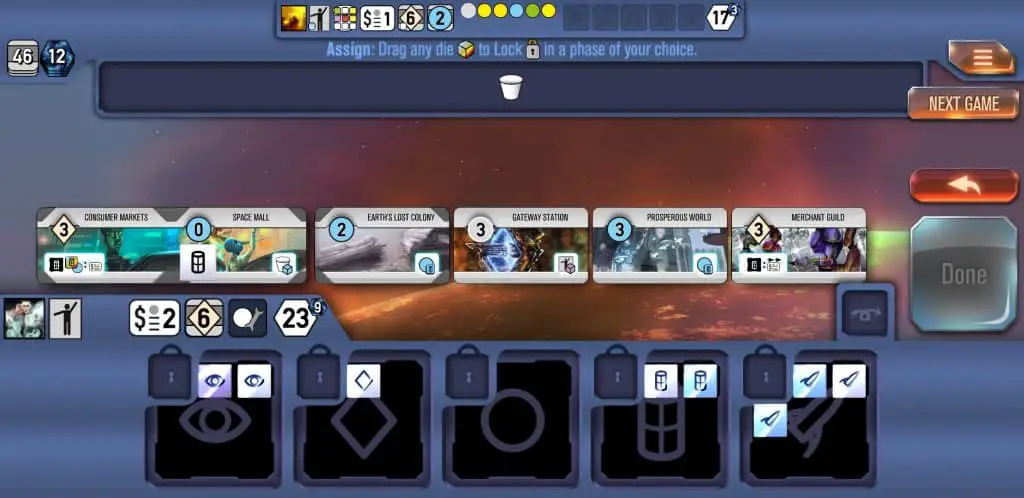Review: Roll for the Galaxy App Review
Is this series on a roll with another out of this world game?
It’s seemingly impossible to review Roll for the Galaxy without noting that it is the spiritual successor to Race for the Galaxy, the same game but with dice instead of cards. Well I’m not here to break the habit, I’m also going to discuss Roll in relation to Race but I’m also going to talk about why I prefer Roll for the Galaxy and why I can see myself playing it far more often than I can see myself playing Race for the Galaxy.
However, before we get into that lets focus on the game we’re here to review; Roll for the Galaxy is an empire building game that sees you utilising dice to take actions, building up your empire of planets and technologies as well as shipping produce for victory points. Points are awarded based on how large your planets and technologies are, what types of goods you are shipping as well as any special abilities gained from the worlds you settle. The player with the most VP when either the VP pool is exhausted or one player has settled 12 planets or technologies in their empire wins the game.
Turns are played simultaneously with players rolling a selection of the dice which display up to 5 symbols and the dice being placed in the corresponding area, exploring, developing, settling, producing, shipping. Players will then secretly choose which of the 5 actions they want to do on the next turn with the assigned dice being the number of that action they can perform. All players reveal their dice and their chosen actions and then all players take all of the actions selected by every player and unused dice are added back to your supply to be rolled on the next turn. This can mean that although you selected the explore action, you may also be able to utilise the dice you have placed on the remaining 4 actions, assuming one of your opponents has selected it. Fans of Race for the Galaxy will recognise this mechanic well as it is a similar one utilised within Race, however the addition of the dice corresponding to the number of actions you can take adds a whole new level to this tried and tested mechanism.
Roll for the Galaxy also adds in a currency element to gameplay which is a new and interesting choice it lays at the feet of players. Where as in Race for the Galaxy, the cards in your hand equate to your currency, Roll includes an actual currency which is required to buy back previously used dice. Balancing using dice with earning enough credits to purchase them back is the key to keeping your engine going and producing VP. Utilise all of your dice on one action in one turn and you can find yourself spending the next few turns earning enough to buy them back, however, carefully balance your money making with your dice usage and you can continually use the majority of your dice on each turn and maximise your VP earning potential.
When it comes to presentation Roll for the Galaxy stays true to the user interface developed by Temple Gates Games for use on their other titles, Race for the Galaxy and Shards of Infinity. It’s a no nonsense slick design that does the most important thing well, gets you into a game as quick as possible. Both online and offline matches are set up with minimal fuss and you can be playing a game within seconds of launching the app. Love it or hate it, the artwork for both tiles and dice are present from the physical game and the digital adaptation stays faithful to the source material. The dice roll satisfactorily and while they aren’t the dynamic dice we see from games such as Roll With It or even One Deck Dungeon, which have a feeling of physicality to them despite being on your device, they still look good which is key for a game that revolves around dice so much.
One of the biggest problems I have with Race for the Galaxy has always been the overly complex iconography, I felt that at a glance the cards were tricky to understand and that I often would find the rules on certain cards mildly confusing leading me to never use those particular cards. The app version of course solved some of the issues by automating a lot of the card actions for me however the lingering difficultly of understanding all of the myriad of symbols remained. Thankfully, Roll for the Galaxy balances this far better than it’s compatriot; the icons are clear and simple to understand, the tiles seem to me to have been simplified in comparison to the cards in Race (although this comes at the loss of variety in tiles compared to cards between the two games) and the iconography is far simpler to understand. All in all this makes Roll for the Galaxy a far more accessible game to me than Race for the Galaxy was.
In terms of play options, Roll for the Galaxy has both online and offline multiplayer as well as solo play against an AI with 3 difficulty levels. Online play is handled through friend codes and is simple to both set up and play with notifications working flawlessly. On the odd occasion I experienced some app crashes when loading the online game via the menu system, however these times were rare. Once again Temple Gate Games have created a challenging AI which keeps solo play entertaining, they utilise a neural network AI which time and time again proves with games such as Roll, Race and Viticulture to provide a challenging and fun AI opponent. (If you want to read a lot more about what neural network AI actually is and why it’s so challenging you really should check out this article.)
Roll for the Galaxy is a fun, lighter take on some of the same mechanics as Race for the Galaxy and is often bemoaned for being luck driven, as most dice games are, and is criticised as such. Yes you are at the mercy of the dice compared to Race for the Galaxy however for me, Roll for the Galaxy is simply a far more accessible game and one which I think I have more fun playing. I enjoy having to adjust my strategy when the dice I get don’t give me what I need that turn or gambling on my opponent taking an action once I see how they’ve built their engine. The simplified tactical options and slight lack of variance in Roll compared to Race makes games that bit easier to play and the game time of around 10 minutes means I often play a best of 3 bout rather than settling for just one game. Whereas I enjoy a 2 player head to head bout in Race for the Galaxy, I often feel like the game drags a little at higher player counts and it’s something I rarely pick up and play when I know there will be more than 2 of us playing; Roll for the Galaxy in contrast is a game which I think plays better with 3 or 4 players, the spread of dice throughout your turn means that there is rarely any down time as you can potentially have multiple actions to take from the multiple areas selected that turn. While both games can at times feel a little like multiplayer solitaire I prefer the fact that you can hedge your bets far easier in Roll for the Galaxy, leaving a spread of dice across the available areas and utilise the choices made by your opponents far more often and easily that you can in Race for the Galaxy. It’s factors like this which mean that I simply prefer to play Roll for the Galaxy compared to Race for the Galaxy.
The app version of Roll for the Galaxy has the same polish and quality we have come to expect from Temple Gates Games be it the UI or the AI and while the artwork itself and theme is not to my tastes the gameplay and accessibility very much are. As a lighter digital board game Roll for the Galaxy is a great pick up and play game and one I’d recommend even if you weren’t a fan of Race for the Galaxy.


